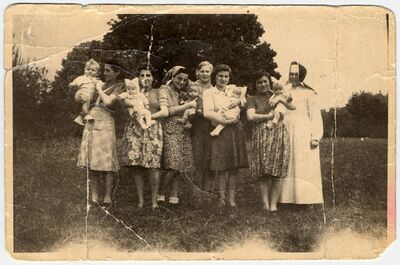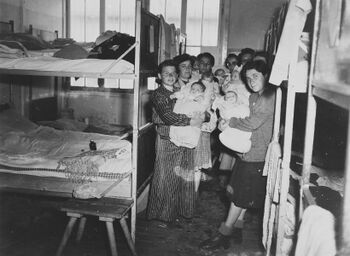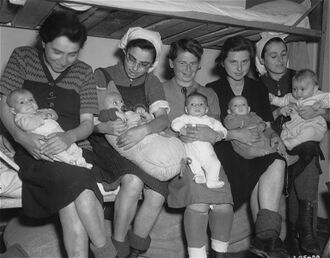Difference between revisions of "Category:Kaufering Babies (subject)"
| (10 intermediate revisions by the same user not shown) | |||
| Line 1: | Line 1: | ||
'''Kaufering Babies''' (see [[Holocaust Children Studies]]) | '''Kaufering Babies''' (see [[Holocaust Children Studies]]) | ||
| Line 12: | Line 8: | ||
The Kaufering Babies were a group of seven babies who were | The Kaufering Babies were a group of seven babies (4 girls, 3 boys), who were born at Kaufering, a sub-camp of [[Dachau]] in Feb-Apr 1945. | ||
Though pregnant women and their babies were almost never permitted to survive, this group of seven pregnant, Hungarian Jewish women, arrived at Dachau in December 1944, was allowed to bear their children, possibly as a bargaining chip for their SS overseers to use when the Allies conquered Germany. Labeled as the ''Schwanger Kommando'' (Pregnancy Unit), they were forced to work in the prisoners’ laundry. Despite appalling sanitary conditions and the lack of food and heat, all seven mothers gave birth to healthy babies (4 girls, 3 boys) between February and April 1945, with the assistance of Jewish dottor [[Erno Vadasz]] (M / Hungary, 1890-1957). As late as 13 March 1945, the head SS camp physician issued an order for the mothers to be transferred from Dachau to [[Bergen-Belsen]]. Thankfully the order was not carried out. The last baby he delivered was born one day after demolition of the crematorium, on April 29, 1945. All seven mothers (and their babies) were liberated in Dachau by the American Army, in satisfactory condition, in May 1945. | |||
[[File:Schwanger Kommando.jpg|350px]] [[File:Schwanger Kommando2.jpg|330px]] | |||
(1) Pictured left to right are Eva Schwartz (Eva Fleischmannovà) with her daughter Maria; Dora Loewy (Dora Löwy) and her daughter Szuszi; Boeszi Legmann (Elisabeth Legmann) with her son Gyuri; Suri Hirsch (Sara Grün) with her son Yossi; Miriam Schwarcz Rosenthal (Miriam Rosenthal) with her son Laci (Leslie); Magda Fenyvesi (Magda Schwartz) with her daughter Judit, and Ibolya Kovacs (Ibolya Kovács) with her daughter Agnes. [@USHMM] | |||
(2) Pictured from left to right are: Ibolya Kovacs with her daughter Agnes; Suri Hirsch with her son Yossi; Eva Schwartz with her daughter Maria; Magda Fenyvesi with her daughter Judit; and Boeszi Legmann with her son Gyuri. Not pictured are: Dora Loewy and her daughter Szuszi; and Miriam Schwarcz Rosenthal and her son Laci (Leslie). [@USHMM] | |||
Their names (and the names of their mothers) are: | |||
* [[Gyuri Legmann]] / [[George Legmann]] (M / Hungary, 1945) -- Elisabeth Legmann (Boeszi Legmann) | |||
* [[Laici Rosenthal]] / [[Leslie Rosenthal]] (M / Hungary, 1945) -- Miriam Schwarcz Rosenthal (Miriam Rosenthal) | |||
* [[Marika Novakova]] / [[Maria Novakova]] (F / Hungary, 1945) -- Eva Schwartz (Eva Fleischmann o Fleischmannovà) | |||
* [[Jossi Grün]] (M / Hungary, 1945) -- Suri Hirsch (Sara Grün) | |||
* [[Agnes Kovács]] (F / Hungary, 1945) -- Ibolya Kovacs (Ibolya Kovács) | |||
* [[Judith Kálmán]] (F / Hungary, 1945) -- Magda Fenyvesi (Magda Schwartz) | |||
* [[Hana Klein]] / Szuzi Löwy (F / Hungary, 1945) -- Dora Löwy (Dora Loewy) | |||
* [[ | |||
* [[ | |||
== Documentary (2010) == | == Documentary (2010) == | ||
| Line 87: | Line 96: | ||
Six of the seven former concentration camp babies are to attend the reunion - their first - at Dachau this Thursday for the opening of a special exhibition on the fate of mothers in the Dachau camps. Germany's ARD television is to air the documentary Wednesday. | Six of the seven former concentration camp babies are to attend the reunion - their first - at Dachau this Thursday for the opening of a special exhibition on the fate of mothers in the Dachau camps. Germany's ARD television is to air the documentary Wednesday. | ||
== Süddeutsche Zeitung (2017) == | |||
In the winter of 1944/45, seven Jewish babies were born in Kaufering I, one of the most terrible subcamps of the Dachau concentration camp. All survived and were freed on April 29, 1945 together with their mothers, who came from Hungary and had previously survived Auschwitz, by soldiers of the 7th US Army in the Dachau concentration camp. Miriam Rosenthal, who emigrated to Canada with her son Leslie and her husband Béla after the liberation, is today the last of the seven mothers who is still alive and who can tell of this miracle in the midst of terror. Now she celebrated her 95th birthday in Toronto with her large family. | |||
It was of course no wonder: the pregnant women who were deported from Hungary to the Auschwitz-Birkenau extermination camp in the summer of 1944 were able to hide their pregnancy from the SS for a long time. They survived because of the solidarity of other inmates who provided them with food and gave them as much protection as possible. The Germans murdered one and a half million Jewish children. The seven pregnant women were brought together in Kaufering I and were to be taken to the Bergen-Belsen death camp with their babies after delivery. The first SS camp doctor in the Dachau concentration camp, Fritz Hintermayer, signed the transfer order in March 1945 - the death sentence for mothers and children. But in the turmoil of the last weeks of the war it did not come to that. | |||
Miriam Rosenthal, who until recently was socially engaged in the Jewish community, told the story of women to the film authors Eva Gruberová and Martina Gawaz. "Born in the concentration camp" was also shown at the Yad Vashem Holocaust memorial in Israel and met with enthusiasm - because the children are living proof that our people defied the National Socialists' will to annihilate - albeit in agonizing memories of six million dead wrote the Auschwitz survivor Max Mannheimer, Vice President of the International Dachau Committee, in the afterword to the book of the same name. The children Leslie Rosenthal, George Legmann, Marika Nováková, Hana Klein, Judith Kálmán, Ágnes Kovács and Jossi Grün (all 72) are the youngest survivors of the Dachau concentration camp and are now honorary members of the Dachau Committee. | |||
== External links == | == External links == | ||
[[Category:Holocaust Children, 1945 (subject)|1945 Kaufering Babies]] | |||
Latest revision as of 05:44, 17 March 2022
Kaufering Babies (see Holocaust Children Studies)
Overview
The Kaufering Babies were a group of seven babies (4 girls, 3 boys), who were born at Kaufering, a sub-camp of Dachau in Feb-Apr 1945.
Though pregnant women and their babies were almost never permitted to survive, this group of seven pregnant, Hungarian Jewish women, arrived at Dachau in December 1944, was allowed to bear their children, possibly as a bargaining chip for their SS overseers to use when the Allies conquered Germany. Labeled as the Schwanger Kommando (Pregnancy Unit), they were forced to work in the prisoners’ laundry. Despite appalling sanitary conditions and the lack of food and heat, all seven mothers gave birth to healthy babies (4 girls, 3 boys) between February and April 1945, with the assistance of Jewish dottor Erno Vadasz (M / Hungary, 1890-1957). As late as 13 March 1945, the head SS camp physician issued an order for the mothers to be transferred from Dachau to Bergen-Belsen. Thankfully the order was not carried out. The last baby he delivered was born one day after demolition of the crematorium, on April 29, 1945. All seven mothers (and their babies) were liberated in Dachau by the American Army, in satisfactory condition, in May 1945.
(1) Pictured left to right are Eva Schwartz (Eva Fleischmannovà) with her daughter Maria; Dora Loewy (Dora Löwy) and her daughter Szuszi; Boeszi Legmann (Elisabeth Legmann) with her son Gyuri; Suri Hirsch (Sara Grün) with her son Yossi; Miriam Schwarcz Rosenthal (Miriam Rosenthal) with her son Laci (Leslie); Magda Fenyvesi (Magda Schwartz) with her daughter Judit, and Ibolya Kovacs (Ibolya Kovács) with her daughter Agnes. [@USHMM]
(2) Pictured from left to right are: Ibolya Kovacs with her daughter Agnes; Suri Hirsch with her son Yossi; Eva Schwartz with her daughter Maria; Magda Fenyvesi with her daughter Judit; and Boeszi Legmann with her son Gyuri. Not pictured are: Dora Loewy and her daughter Szuszi; and Miriam Schwarcz Rosenthal and her son Laci (Leslie). [@USHMM]
Their names (and the names of their mothers) are:
- Gyuri Legmann / George Legmann (M / Hungary, 1945) -- Elisabeth Legmann (Boeszi Legmann)
- Laici Rosenthal / Leslie Rosenthal (M / Hungary, 1945) -- Miriam Schwarcz Rosenthal (Miriam Rosenthal)
- Marika Novakova / Maria Novakova (F / Hungary, 1945) -- Eva Schwartz (Eva Fleischmann o Fleischmannovà)
- Jossi Grün (M / Hungary, 1945) -- Suri Hirsch (Sara Grün)
- Agnes Kovács (F / Hungary, 1945) -- Ibolya Kovacs (Ibolya Kovács)
- Judith Kálmán (F / Hungary, 1945) -- Magda Fenyvesi (Magda Schwartz)
- Hana Klein / Szuzi Löwy (F / Hungary, 1945) -- Dora Löwy (Dora Loewy)
Documentary (2010)
Six (of the seven) Jewish Babies Born in Dachau Reunite 65 Years Later
German television is to air a television documentary which explores the miracle of how these three infant boys and four infant girls slipped through the cracks of the Nazi killing machine.
U.S. soldiers who liberated a Nazi concentration camp in April 1945 were amazed to discover, among the countless famished and dead, seven Jewish mothers and their babies, who had somehow avoided execution or starvation.
This week, six of those former babies are to gather for an emotional reunion at Dachau on the outskirts of Munich.
German television is to air a television documentary which explores the miracle of how these three infant boys and four infant girls slipped through the cracks of the Nazi killing machine.
George, Jossi, Leslie, Marika, Agnes, Judit and Szuzi spent the first months of their lives in Kaufering I, a camp 50 kilometres west of Munich.
Marika Novakova, 65, never understood when she was growing up in the Slovakian small town of Dunajska Streda why her birth certificate said she had been born in Kaufering, a village in Bavaria. It did not make sense, but her mother refused to explain why.
A couple of documentary makers employed by German broadcaster WDR, Eva Gruberova and Martina Gawaz, asked the mother for an interview, but Eva Fleischmanova refused. Finally she re-considered. As the cameras filmed, she unveiled her past.
Fleischmanova describes the horrors of the war, how she was nearly gassed at Auschwitz and ended up in Kaufering. She tells of her daughter's birth in captivity, and how she kept her personal Holocaust story secret because of anti-Semitism in Slovakia.
Miriam Rosenthal, 87, can barely bring herself to speak in some sections of the documentary. Holding her son Leslie, she can be seen with Fleischmanova in the extraordinary, 65-year-old, black-and-white photo of the young mothers between bunks in a dormitory.
The two woman documentary makers began their research using that photo.
Miriam Rosenthal's description of the war years on camera is the first time she spoke German again after leaving Germany for Canada.
She and her husband, also a Holocaust survivor, built a new life for Leslie and themselves in Toronto.
The horrors of the past still loom over Miriam, who often breaks into tears as she speaks.
"As a girl, I imagined I had been born in a forest," says Marika Novakova. "All my mother would tell me was that people were treated very cruelly there. I did not know what sort of place it was at all."
The documentary makers take Marika on a journey to the way-stations of her mother's ordeal: to the fence at Auschwitz, to the German city of Augsburg where the women were used as slave labour in a arms factory, and to Kaufering I.
Dachau concentration camp had several satellite camps like Kaufering where slave labour was kept close to factories.
Marika's mother was twice inspected by Josef Mengele, the doctor of death at Auschwitz, as he selected those to be killed and those to be kept for labor. He pinched her breast to see if milk came out.
Eva Fleischmanova somehow managed to hold in her belly so that he did not notice she was pregnant.
Heinrich Himmler, head of the SS, was determined to exterminate all Jewish children. His policy was set out in the secret speech he gave at Poznan, Poland on October 6, 1943.
"I do not consider it justifiable to exterminate the men, meaning to kill them or get them to be killed, while allowing the revengers, in the form of children, to grow up and face our sons and grandsons," said Himmler.
The Nazis deliberately killed children: the toll of minors in the Holocaust is estimated at as much as 1.5 million.
Miriam Rosenthal also remembers the moment when she narrowly escaped being put to death.
"An SS man came round with a loudspeaker and he was shouting, 'All the women come outside. You've been given a double ration of bread.'"
Most of the women obeyed, but Rosenthal stayed indoors. A voice inside told her to stop. "All those women ended up in the crematorium," she said.
Rosenthal was shipped from Auschwitz to Kaufering at the age of 22.
The young mothers survived in Kaufering thanks to the solidarity of other women prisoners, who cared for the newborns when the mothers were summoned to work. Fellow prisoners hid the babies and gave them water and food.
The seven mothers and their babies scattered after the Second World War. It was Rosenthal who re-opened a connection by sending a copy of the black-and-white photo to her former fellow inmate Fleischmanova.
The daughter Marika saw the picture and resolved to fly to Canada to meet Rosenthal to hear the story of her first weeks of life.
"I would never have dreamed I would see little Marika again," Rosenthal said.
Six of the seven former concentration camp babies are to attend the reunion - their first - at Dachau this Thursday for the opening of a special exhibition on the fate of mothers in the Dachau camps. Germany's ARD television is to air the documentary Wednesday.
Süddeutsche Zeitung (2017)
In the winter of 1944/45, seven Jewish babies were born in Kaufering I, one of the most terrible subcamps of the Dachau concentration camp. All survived and were freed on April 29, 1945 together with their mothers, who came from Hungary and had previously survived Auschwitz, by soldiers of the 7th US Army in the Dachau concentration camp. Miriam Rosenthal, who emigrated to Canada with her son Leslie and her husband Béla after the liberation, is today the last of the seven mothers who is still alive and who can tell of this miracle in the midst of terror. Now she celebrated her 95th birthday in Toronto with her large family.
It was of course no wonder: the pregnant women who were deported from Hungary to the Auschwitz-Birkenau extermination camp in the summer of 1944 were able to hide their pregnancy from the SS for a long time. They survived because of the solidarity of other inmates who provided them with food and gave them as much protection as possible. The Germans murdered one and a half million Jewish children. The seven pregnant women were brought together in Kaufering I and were to be taken to the Bergen-Belsen death camp with their babies after delivery. The first SS camp doctor in the Dachau concentration camp, Fritz Hintermayer, signed the transfer order in March 1945 - the death sentence for mothers and children. But in the turmoil of the last weeks of the war it did not come to that.
Miriam Rosenthal, who until recently was socially engaged in the Jewish community, told the story of women to the film authors Eva Gruberová and Martina Gawaz. "Born in the concentration camp" was also shown at the Yad Vashem Holocaust memorial in Israel and met with enthusiasm - because the children are living proof that our people defied the National Socialists' will to annihilate - albeit in agonizing memories of six million dead wrote the Auschwitz survivor Max Mannheimer, Vice President of the International Dachau Committee, in the afterword to the book of the same name. The children Leslie Rosenthal, George Legmann, Marika Nováková, Hana Klein, Judith Kálmán, Ágnes Kovács and Jossi Grün (all 72) are the youngest survivors of the Dachau concentration camp and are now honorary members of the Dachau Committee.
External links
Pages in category "Kaufering Babies (subject)"
The following 7 pages are in this category, out of 7 total.
1
- Jossi Grün (M / Hungary, 1945), Holocaust survivor
- Judith Kálmán (F / Hungary, 1945), Holocaust survivor
- Hana Klein / Szuzi Löwy (F / Hungary, 1945), Holocaust survivor
- Agnes Kovács (F / Hungary, 1945), Holocaust survivor
- Gyuri Legmann / George Legmann (M / Hungary, 1945), Holocaust survivor
- Marika Novakova / Maria Novakova (F / Hungary, 1945), Holocaust survivor
- Leslie Rosenthal (M / Hungary, 1945), Holocaust survivor


